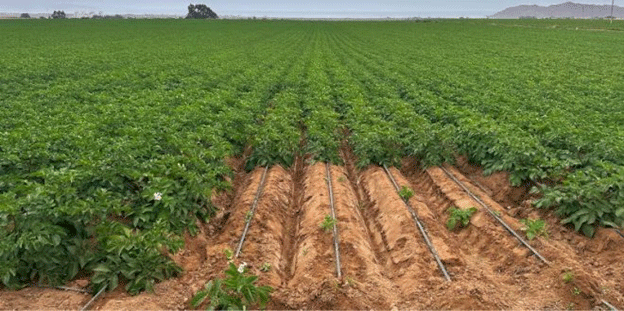Netafim, a leader in precision irrigation solutions, recently released an extensive Life Cycle Analysis (LCA) demonstrating the major environmental advantages of adopting drip irrigation for potato cultivation. The study, conducted in collaboration with Potato Solutions and Drip UK, focused on comparing the environmental impacts of drip irrigation versus traditional rain gun systems in potato farming.
Global Warming Potential and Water Use
The LCA study underscores the significant reduction in Global Warming Potential (GWP) when using drip irrigation for potato cultivation. GWP is a critical metric used by the Intergovernmental Panel on Climate Change (IPCC) to measure the heat a greenhouse gas traps in the atmosphere over a specific period, compared to carbon dioxide. This measure is vital in understanding and mitigating climate change impacts.
According to the study’s findings, the GWP for fresh potatoes irrigated with drip systems is 54% lower than those irrigated with rain guns. This substantial reduction highlights the effectiveness of drip irrigation in lowering greenhouse gas emissions associated with potato farming.
Water Efficiency
Water scarcity and efficiency are pressing issues in agriculture, and the LCA study reveals that drip irrigation systems require significantly less water compared to rain gun systems. For processing potatoes, drip irrigation uses 40% less water per ton of potato than rain gun systems. This efficiency not only conserves water but also enhances the sustainability of potato farming, particularly in regions facing water shortages.
Practical Implications
The trial conducted from March to October 2022 in Norfolk, East Anglia, provides concrete evidence of the benefits of drip irrigation. Tim Kitson of Potato Solutions emphasized the adaptability and reliability of drip irrigation, particularly in water-scarce areas. “Even under ever-changing conditions and the looming threat of water scarcity, drip irrigation has shown remarkable reliability and resilience, ensuring water preservation and effective energy management,” Kitson noted.
Max Moldavsky, Director of Innovation and Climate Solutions at Orbia Netafim, highlighted the broader implications of these findings: “In the fight against climate change, drip irrigation technology emerges as a powerful ally, paving the way for a more sustainable agricultural landscape. Amidst mounting environmental pressures, farmers and companies are confronted with urgent calls to mitigate their impact. Sustainable growing is not just a choice but a necessity to meet these demands and safeguard our planet’s future.”
Netafim’s study reaffirms the critical role of innovative irrigation technologies in promoting sustainable agriculture. Drip irrigation not only reduces the environmental footprint of potato farming by lowering GWP and conserving water but also enhances productivity and resilience in the face of climate change and water scarcity. As the agricultural sector faces increasing pressures to produce more with fewer resources, precision irrigation solutions like those offered by Orbia Netafim will be crucial in achieving these goals.







